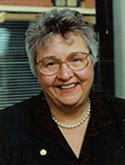Nurse Leader Develops Nursing School in Haiti
Peterson to Serve as First Vice President of Alumni Council
Nurse Leader Develops Nursing School in Haiti
By Ron Supan

“Although the United States has a nursing shortage, there is only one nurse per 10,000 people in Haiti compared to 77 per 10,000 people in the U.S.,” says Ruth Barnard ’58, PhD, who was the leader in starting the Faculté des Sciences Infirmières de l’Université Episcopale d’Haïti (FSIL), a new nursing school in Léogâne, Haïti. She hopes that the nursing school, by educating a new generation of nurses, will begin to address Haiti’s overwhelming health care needs.
The school, which opened in January 2005, features six classrooms (including two clinical skills labs and one computer lab) and an eight-bedroom dormitory. It now has more than 60 students enrolled in the first two years of the four-year program and is the first baccalaureate four-year nursing program in Haiti.
Barnard taught undergraduate, master’s, and doctoral levels during her 25-year tenure at the University of Michigan School of Nursing, Ann Arbor, where she was an associate professor and also served as an academic information specialist in the school’s Office of Academic Affairs. After her retirement, the Presbyterian Medical Benevolence Foundation obtained a grant from the American Schools and Hospitals Abroad program of USAID to build a Haitian nursing school and dormitory. Barnard was referred by her church pastor to the foundation and she agreed to step in.
In laying the groundwork for the school, Barnard’s priority was making contacts to assist with the project. Her team worked with the Episcopal Diocese of Haiti as well as other Presbyterian and Episcopalian groups in the United States. In 2003, they helped sponsor a three-day continuing nursing education program as part of a medical conference in Port-au-Prince, providing free programs for nurses from all over Haiti. “Because I insisted that the school had to be part of a university, the Bishop made the school part of the Episcopal University of Haiti,” says Barnard.
Hilda Alcindor, a Haitian-educated nurse, was appointed as dean of FSIL in October 2004. “We had curriculum plans and government requirements in place, but Dean Alcindor was the one who really made the school,” says Barnard. A celebration was held to dedicate the building on January 5, 2005, and the first class of 36 students, including six men, started January 10, 2005. The second class, consisting of 37 students, including six more men, began in October 2005.
In 2005, the First Presbyterian Church of Ann Arbor presented Barnard with its annual Peacemaking Award for her work toward development of the FSIL. She is optimistic about the school’s future. “The school remains very enthusiastic that it is headed in the right direction,” Barnard says. “I believe that God was very active in getting this project off the ground because the right people came along at the right time.”
Peterson to Serve as First Vice President of Alumni Council
By Ron Supan

Geraldine Peterson ’64, who will serve as first vice president of the Johns Hopkins University (JHU) Alumni Council beginning in November, says her passion for involvement with Johns Hopkins began more than four decades ago.
“It was instilled in us as students that the school meant a lot to us, we meant a lot to the school, and that we should stay in touch, not only with our classmates, but with what was happening at the school,” says Peterson. “My major goal as first vice president will be to foster more complete integration of the non-Homewood schools and alumni into the university community, and I will welcome working with others with the same goal.”
An active member of the Washington D.C. Chapter of the JHU Alumni Association, Peterson has served as secretary, vice-president, and president. She also served on several committees, and chaired the Community Services Grants Program, Chapter Support Committee, and is just completing her year as second vice president for the Alumni Council.
The Alumni Association exists to promote the welfare of the Johns Hopkins University, broaden and sustain friendships among its alumni, and stimulate alumni interest in the university. The Alumni Council governs the JHU Alumni Association and is responsible for the overall direction and management of the association. The council includes approximately 150 voting members and eight student representatives, one from each division of the university.
Peterson is a 1964 graduate of the Johns Hopkins Hospital School of Nursing and her nursing experiences included the ER, ICU, and work as a family nurse practitioner in both family practice and OB-GYN settings. She currently is the vice president of regulatory affairs at Garvey Associates, Inc, and she has worked in regulatory affairs and project management for the past 22 years, consulting to the pharmaceutical industry. “I firmly believe that my education and experience as a nurse have added immeasurably to my success in the field of pharmaceutical development,” she says.
Having followed the school’s fortunes with interest, Peterson is upbeat about what lies ahead in her involvement with the Alumni Council. “I am very excited about this opportunity,” she says, “especially because I believe it reaffirms the presence and position of the School of Nursing within the JHU community.”
^top